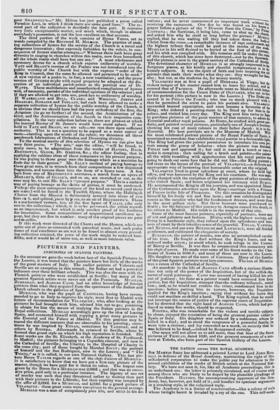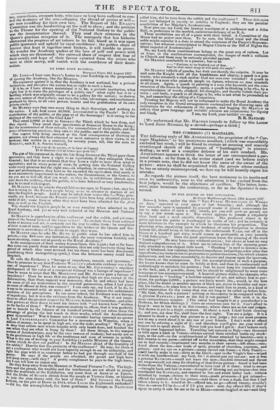THE NATION versus THE ROYAL ACADEMY.
SIR MARTIN SHEE has addressed a printed Letter to Lord JOHN Run- time. in defence of the Royal Academy, maintaining the right of this self-elected corporation to make the public pay for admission to the annual exhibition of the works of British artists at the National Gal- lery. We have not seen it, for, like all Academic proceedings, this is an underhand one : the letter is privately circulated, and of course only among those who are likely to be duped by the plausible pleadings of the President. HAYDON, the uncompromising opponent of the Aca- demy, has, however, got hold of it ; and handles its specious arguments in a crushing style, in the subjoined reply. The Academy is in a flutter of consternation—like a colony of owls whose twilight haunt is invaded lay a ray of the sun. This self.seeks leg, supercilious, arrogant body, who have so long been suffered to con- trol the destinies of the arts—clipping the thread of genius at will— are now trembling for their own fate. The Report of Mr. EWART'S Committee was the handwriting on the wall to them ; and the petition to the Throne for the opening of the National Gallery to the public was the interpretation thereof. They read their sentence in the Queen's gracious reception of It. The monopoly that has hitherto
i obstructed the progress of art totters to its fall, based as it was upon
public ignorance and upheld by royal confidence : the golden chain of interest that kept it together once broken, it will tumble to pieces. No wonder the Academy quakes at the loss of pelf and power with which they are threatened : the outward show of respect that fear of their enmity and hope of their favour extorted from the artists who were at their mercy, will vanish with the overthrow of their domi-
tuition.
TO LORD JOHN RUSSELL.
Iluirwood Place, 22d August 1837.
Div Loan—I have seen SHEE'S Letter to your Lordship on the proposition of opening the Academy., like the Museum. His argument against It is, that the Academy is not national, but a private institution, and therefore the nation has no right to such a boon. If it be, as I have always. maintained it to be, a private institution, what right has it to claim the privileges of a public one? what right has it to a building which was originally meant to be a gallery fur the nation ; to destroy the very nature of that gallery, and turn the eclat, advantages, and emoluments produced by them, to its own private benefit and the gratification of its own private circle? Sir MARTIN says they owe every thing to their Sovereign, and nothing to the nation. I ask, how came 40,0001. accumulated in the Funds? Is it the cootribution of the public, or the presmt of the Sovereign? is it owing to the shillings of the nation, or the Civil List ? They owed 5,0001. at first to GEORGE the Third, which he lent them, and they repaid. They owed their apartments at Somerset House to the King; but the maintenance of their schools, the accumulation of their funds, and the power of bestowing pensions, they owe to the public, and to the public alone. One copilot help being amused at the fatal consequences of shutting up painters, not always the best educated or most extensive in their views, in an Academy, like monks in a convent, for seventy years, till, like the man iu BOILEAu, each R. A. fancies himself, " Lui soul 410 Is nature, et In base et l'appui
Et le dixicale ciel ne tonne gee pour Mi."
The gist of his argument is, that the late King GEORGE the Third gave them apartments, and they have a right to an equivalent, if they relinquish them. Granted ; but that is no evidence that they have a right to more than what is equivalent; and in every point of view, by getting into the National Gallery under every pretence but the right one—in situation, in convenience, in influ- ence and predominance, they have so far exceeded the equivalent, that surely it is not excessively impertinent in the nation, the Government, or the Queen, to say you are so well off, that you must, as they do in exhibitions abroad, open your doors for nothing, that the public, who have behaved so very handsomely, may be treated with respect. Sir MARTIN says he admits the exhibitions are open in France ; but, says lie, that is owing to the French people being more in advance in matters of tut than the English people. And it may be asked, bow comes this ?—Why, prin- cipally, my Lord, because the French people have been long admitted gratis to works of art : some time or other they must have been admitted for the first time, as well as the English.
Why should the English people be so very naughty when admitted to the Royal Academy, and yet so very well behaved at the Museum and National Pictures?
Sir MARTIN is apprehensive of the coalheaver and the rabble, and yet com- plains of the brutal tastes of the lower orders ! To exclude them from national works of science and art, is certainly nut the way to refine them : lie complains of their want of taste, and his opposition to the wishes of the Queen and Go. cerement is no evidence of his desire to supply that want. Sir MARTIN says lie asks Mr. Hum: in public what he has asked him in prirate,—viz. Did ever any institution, after the most rancorous hostility and severe scrutiny, come out so purely as the Royal Academy ? In the management of their money transactions, this is just; but so far have they come out purely from other accusations, that not only has every thing been proved of which they were accused, but ten times more has been discovered, (confirming their monopolizing spirit,) than the bitterest enemy could have imagined. Ile calls the Evidence a "farrago of impudence, conceit, and ignorance." Does be presume to say that Professor WA A G EN'S admirable evidence was a far- m° of impudence? Does he mean to say that Mr. COCK KRELL'S excellent development of the value of a competent tribunal was a farrago of impudence? Does he mean to insist that Mr. MORRISON and Mr. SK ENE gave a farrago of impudence? Does he mean that nay proving that high art was ruined at the Reformation, that State support was necessary, that he and others had been the cause of all my misfortunes by the cruelest persecution, when I had given no cause of offence at first, was conceit ? I can only say, my Lord, if he do, he ia not to be reasoned with as sane ; and one can only lament the unfortunate condition of his perceptions. In one sense indeed, the Evidence was a farrago of impudence, but it was the evidence from the Academy. Was it not inipu- dence to affect the greatest respect for MARTIN, before the Committee, and order their porters at their doors to send his letters with "not known here" written on the backs of them ? Was it supreme modesty to affirm, that it was perfectly just to benefit by the labours of six hundred artists, and yet refuse them the advantage of giving the last touch to their works, which the Academicians grant themselves? Was it honest not to remember having returned no answer to Lord CASTLEREAGH'S Committee for a monument to Waterloo, when a million of money, to be spent in high art, was the stake pending? Vas it just to deny that artists sent whole-lengths with only heads done, and finished the rest when they see what is hung by them ? All these things, to the warped motions of Academicians, may be the very essence of modesty, but surely not so to the gentleman in high life or the tradesman and man of science in middle. What is the use of writing to your Lordship (a public Minister of the Queen) a letter which he does not publish? Is Sir 3laurrie afraid of the brutality of the rabble? Does he fear the profanity of the coalheaver ? He may, for there is not a coalheaver who would not have sagacity enough to see its imbecility, and light his pipe with it in contempt before he had got through one-half of his porter. He says if the people are admitted, the proud and high- born will keep away—will they? A pretty compliment he pays to the highborn;but I can tell him an unjust one. Do they keep away from the Museum or National Pictures ?—No. The high- born and the proud, the wealthy and the intellectual, are not afraid to mingle with the multitude at the Exhibition, any more than at Ascot or at Epsom. Did the Duke of SUSSEX shrink from the people at Victoria Gate, or hesitate to join the nine cheers with the best of them? Did GEORGE the Fourth Imitate, on the pier at Dover in 1814, when Lotus the Eighteenth embarked? did lie, the accomplished, the finest gentleman in Europe, as NAV*1.1g011 called him, did he turn from the rabble and the coalheaver ? These delicacies have not belonged to royalty or nobility in England ; they are the peculiar sensibilities of her Majesty's Academicians. Bull, in preference to the morbid, cadaverous delicacy of an R.A.
House had no power over them. To be sure, the blood royal and the blood noble might consider it a duty to attend the summons of the People's Represen- tatives; but whoever contemplated in Magna Charts or the Bill of Rights the Now give me, my Lord, the brawny manliness of a coalheaver and a John These morbidities are all of a piece with their belief. A Committee of the blood imperial of Academicians ?
No, my Lord, these considerations belong to the great sera of reform. Let us hope, in the ameliorations contemplated, the danger of such a collision in Church and State may be seriously provided against. Sir MARTIN coneludeth in a passion; but to be
Furious, to he frighten out of fear.
And in that mood moon will peck the mgt.."
Sir MARTIN talketh of quacks, but cloth not identify the culprits. It may be said unto the Knight with all due humbleness and charity, a quack is a pre. tender, who assumeth a rank neither God nor man ever intended I A quack in painting is a man who paintetb people oo tiptoes, whereon no man standeth at all times. Again, a quack in painting is a man who knoweth not the con- struction of the forms he designeth ; again, a quack in thinking is he who, by a superabundance of words, cloaketh his thoughts, and thereby hideth their po- verty ; and lastly, a quack in all things is he, who is not what he pretendeth to be, and cannot bear the sifting of a Committee. Trusting her Majesty will not be influenced to make the Royal Academy the only exception in the liberal arrangements contemplated for throwing open all institutions for the refinements of the people, and begging Sir MARTIN to reflect, that gross language and irritable soreness are unbecoming his dignity and blood, I am, my Lord, your faithful sees ant, B. R. HAMM B. R. HAMM
[We understand that Mr. HAYDON intends to follow up this Letter to Lord JOHN RUSSELL by a second—perhaps a third.]



























 Previous page
Previous page